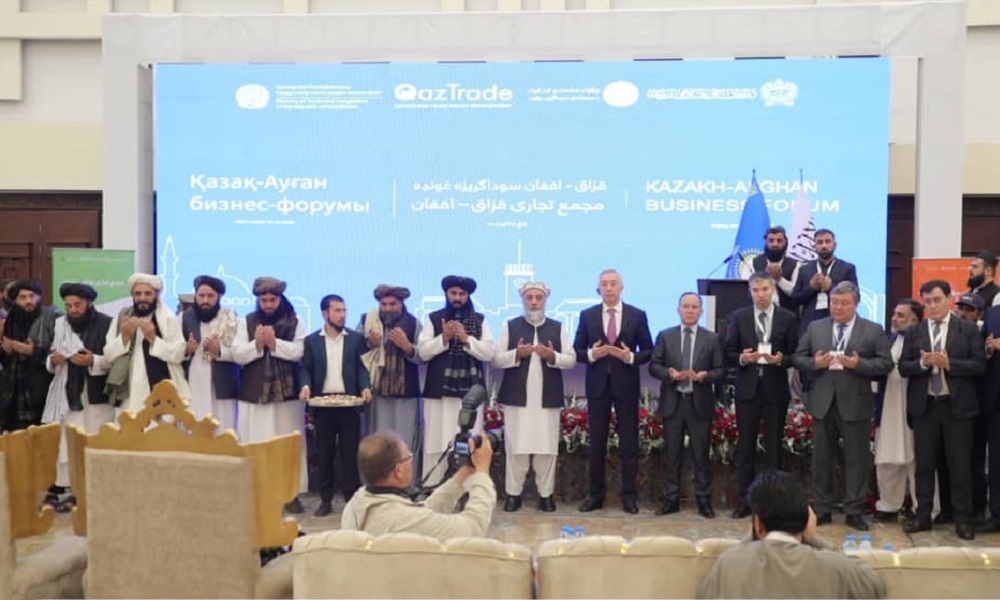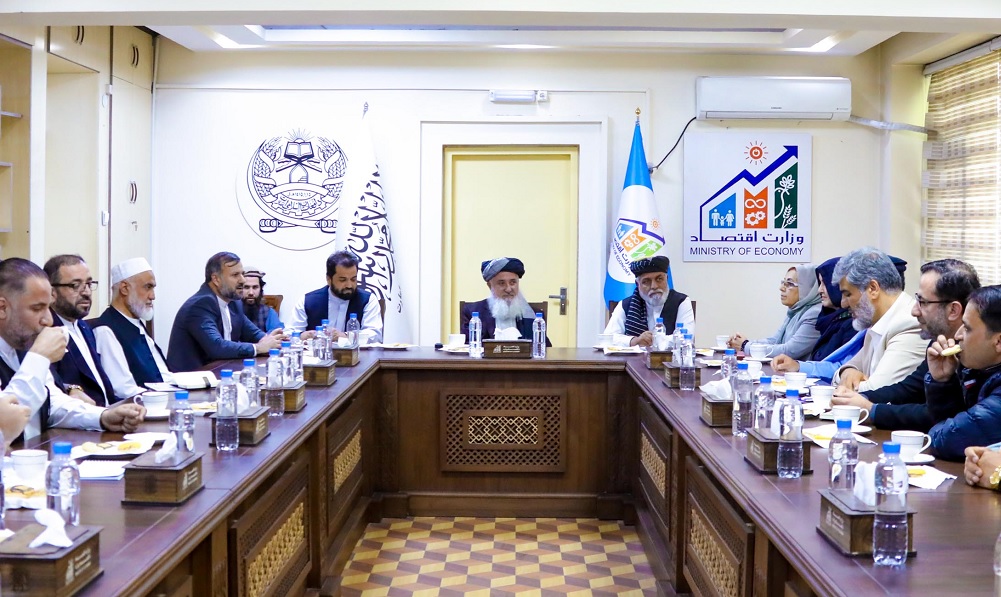Business
Afghanistan sells 20,000 tons of crude oil for $10.5 million
The Ministry of Mines and Petroleum on Sunday sold 20,000 tons of crude oil for $10.5 million, said acting Minister of Mines and Petroleum Shahabuddin Delawar.

The Ministry of Mines and Petroleum on Sunday sold 20,000 tons of crude oil for $10.5 million, said acting Minister of Mines and Petroleum Shahabuddin Delawar.
Speaking at a bidding ceremony, he said the oil was extracted from the Angut area of the Amu Darya oil field and was sold to a local company.
Delawar added that bidding for the extraction and exploration of 11 oil and gas blocks across an area of 23,000 square kilometers in Herat province will be held in the near future.
According to him, contracts will also be awarded for oil extraction in Katwaz area of Paktika Province.
Based on the rules of the Ministry of Mines and Petroleum, the winning companies are obliged to process crude oil inside the country, as it would provide job opportunities to locals.
Meanwhile, Delawar said that they are committed to using professional companies in the mining sector.
Business
Afghanistan’s growth prospects remain uncertain amid global uncertainty: World Bank report
According to the report, in Afghanistan, despite aid cuts, the economy is estimated to have grown by 2.5 percent in FY24-25, which was slower than the pace of population growth.

Amid increasing uncertainty in the global economy, South Asia’s growth prospects have weakened, with projections downgraded in most countries in the region, including Afghanistan.
Stepping up domestic revenue mobilization could help the region strengthen fragile fiscal positions and increase resilience against future shocks, said the World Bank in its twice-yearly regional outlook – the South Asia Development Update – which was released on Wednesday.
According to the report, in Afghanistan, despite aid cuts, the economy is estimated to have grown by 2.5 percent in FY24-25, which was slower than the pace of population growth.
Growth is forecast to increase only moderately to 2.2 percent in 2025/26, the World Bank report stated.
Coinciding with the release of the South Asia report was the World Bank’s Afghanistan Development Update report which explained the situation in more detail.
Stating that while the country’s economy is gradually recovering, the outlook remains uncertain due to growing fiscal pressures, a widening trade deficit and persistent poverty and food insecurity.
The report stated that these factors continue to strain households and hinder inclusive growth.
However, Afghanistan recorded its second consecutive year of growth in 2024, the World Bank stated, adding that the recovery was largely driven by the agriculture sector.
Manufacturing and services remained subdued due to an unfavorable business environment, persistent export barriers and declining foreign aid.
Modest gains in private consumption and real estate investment contributed to growth, the report stated, adding that rising imports widened the trade deficit, increasing external vulnerabilities.
At the same time, rapid population growth and the return of refugees continue to strain job creation and public service delivery, further deepening the fragility of the economy.
Deflation meanwhile persisted in 2024, with food prices having declined sharply. Non-food inflation remained stable. Persistent deflation continued in 2024,
Poverty, food insecurity, and malnutrition however remained pressing challenges and despite modest wage growth, high unemployment and restrictions on women continue to strain livelihoods, the report stated.
Early this year, 14.8 million people faced food shortages, while acute malnutrition – now affecting 4.7 million women and children – is worsening. The World Bank warned that without urgent action, human capital development will be further undermined.
Fiscal pressures meanwhile remained high as domestic revenue mobilization, though relatively strong, is insufficient to offset the sharp decline in aid.
The report also stated that exports declined in 2024, while imports surged – widening the trade deficit.
The increase in imports however was driven by rising industrial demand and substitution of domestic consumer goods.
The afghani (AFN) currency, which had appreciated significantly in 2023 due to strong foreign inflows stabilized with slight depreciation in 2024 but the banking sector remained fragile.
The World Bank reported that economic growth is expected to slow to 2.2 percent in 2025 amid aid disruptions, before gradually recovering to 2.5 percent in 2026–27.
The organization however warned that while Afghanistan’s youth remain a vital source of resilience and untapped potential, urgent action to expand job opportunities for them is needed.
Business
Afghanistan-Kazakhstan trade soars by 32%, target set at $3 billion, says Azizi

Acting Minister of Industry and Commerce, Nooruddin Azizi, stated at the end of the first day of the Kazakh-Afghan trade exhibition that trade volume between the two countries has increased by 32 percent.
He added that both sides aim to raise bilateral trade to $3 billion.
According to a statement from the Ministry of Industry and Commerce, Azizi welcomed the visit of the Kazakh delegation to Afghanistan and expressed appreciation for Kazakhstan’s humanitarian assistance, support, and collaboration, including in the area of digitalizing Afghan government institutions.
Azizi emphasized the importance of connecting Central Asia to South Asia through Afghanistan and discussed expanding trade agreements, holding exhibitions of products and goods in both countries, establishing trade centers in Kabul and Almaty, and facilitating exports and imports between the two nations.
Kazakh Deputy Prime Minister Serik Zhumangarin also stressed that Afghanistan and Kazakhstan are key strategic partners in the region. He described the holding of the business forum as significant for enhancing economic cooperation, establishing new trade relations, exchanging experiences, and promoting joint initiatives.
Zhumangarin stated: “We believe a stable and prosperous Afghanistan is a key factor for peace and stability in the region and has the potential to become a major logistical hub connecting Central and South Asia.”
The exhibition of Kazakhstani products and goods was held at the invitation of the Ministry of Industry and Commerce, with the participation of 25 Kazakh companies.
Business
Acting Minister of Economy meets with Afghan businessmen abroad

Qari Din Mohammad Haneef, Acting Minister Economy, has met with a number of Afghan businessmen and experts living in Germany, France, Italy, Britain, Canada and the United States.
In a recent meeting, the economic and social situation of the country was discussed.
The Afghan businessmen and experts expressed their satisfaction with the security situation and considered the economic programs of the IEA important in improving the economic situation.
The Acting Minister of Economy, explaining the opportunities and facilities available to attract investment in various sectors, called on all Afghan businessmen living abroad to use these opportunities and invest within the country in order to improve the economic situation and create job opportunities.
-

 Sport4 days ago
Sport4 days agoAfghanistan qualify for U19 Cricket World Cup 2026
-

 Regional5 days ago
Regional5 days agoDeadliest US strike in Yemen kills 74 at oil terminal, Houthis say
-

 World4 days ago
World4 days agoThousands of protesters rally against Trump across US
-

 World4 days ago
World4 days agoIran, US end nuclear talks in Rome, agree to meet next week
-

 Latest News3 days ago
Latest News3 days agoPolio vaccination campaign launched in Afghanistan
-

 International Sports3 days ago
International Sports3 days agoIPL 2025: 14-year-old Vaibhav Suryavanshi becomes youngest IPL player
-

 Latest News2 days ago
Latest News2 days agoChina invites various Afghan delegations to attend Shanghai forums
-

 International Sports1 day ago
International Sports1 day agoIPL 2025: Robo-Dog ‘Champak’ explained






















